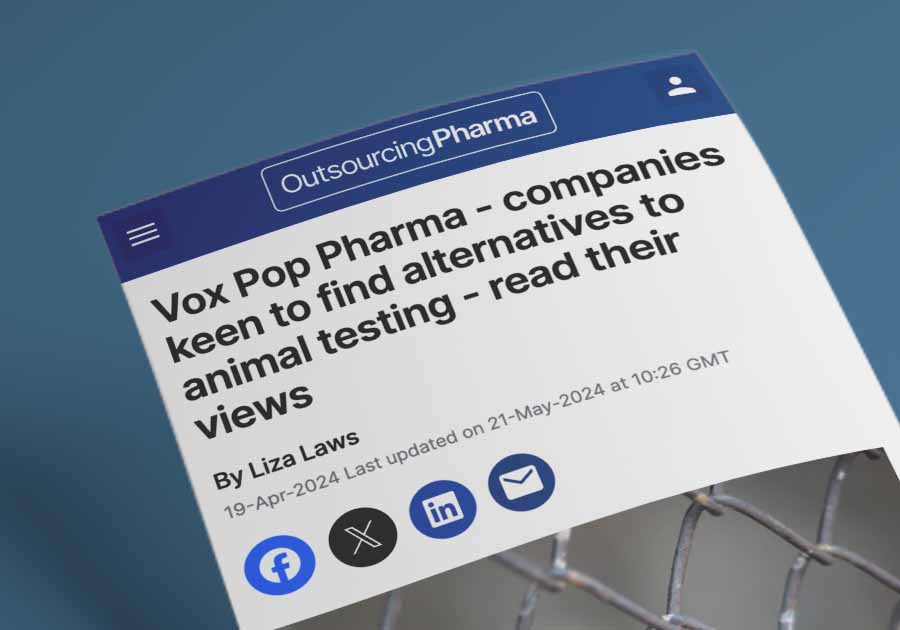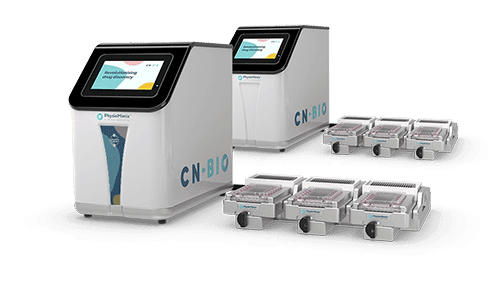Resource > Articles >
Vox Pop Pharma – companies keen to find alternatives to animal testing – read their views
Outsourcing Pharma article
Filed under: General OOC

This article was originally published in Outsourcing Pharma on 19 April 2024.
“Earlier this week, Charles River Laboratories International, Inc. revealed its Alternative Methods Advancement Project (AMAP), which it said is a strong initiative aimed at changing drug discovery and development by exploring alternatives to animal testing.”
The company said its project represents a significant investment of $200 million over the past four years, with an additional $300 million earmarked for the next five years. In what it has called a comprehensive investment strategy, Charles River said it encompasses a range of technological innovations, strategic partnerships, and advocacy efforts all geared toward reducing reliance on animal testing.
We put the news to others within the industry to find out whether they think the time for testing on animals for the benefit of humans has an end in sight.
Zizi Imatorbhebhe, CEO of Bios Health Group (Atlanta, Georgia, USA), said:
“Exciting advancements in scientific research are focusing on alternatives to animal testing, demonstrating a commitment to ethical practices while recognizing their benefits. Researchers are using innovative methods such as in vitro testing, human tissue studies, sophisticated modeling, and micro-dosing, which promise to replicate human biology more accurately and streamline research processes.
Collaboration among scientists, regulators, and industry leaders is essential for validating these alternatives and ensuring reliable data. Adopting these methods can enhance ethical standards, deepen our understanding of treatments, and accelerate drug discovery and development, ultimately improving lives. This shift could also prove cost-effective, freeing resources for additional breakthroughs. A collaborative approach among businesses, researchers, and regulators will pave the way for a humane and efficient research landscape.”
Dr. Gregory Gasic, Primary Author and co-founder of VMedX, a platform for virtual medical assistance expertise, stated, “Animal testing, inescapably, has played an integral part in the development of life-saving drugs and understanding of human biology, so systematically eliminating it would necessitate robust and reliable alternatives. Ideally, in silico models and organs-on-chip could step into that role, but they must be put through rigorous assessments to ensure they function as accurately and predictively as possible.
It is prudent to take a middle-of-the-road strategy in the interim. By this, I mean that while we strive to reduce animal testing, we should also be improving our current animal testing methods in terms of animal welfare. Refinement of procedures, reduction in the number of animals used, and replacement with non-animal methods – the 3Rs of animal research – should be implemented as part of any ethical testing considerations.
Lastly, I believe there will likely always be a role for animal testing in some capacity. For instance, testing for systemic toxicity or modeling complex biological interactions will continue to require traditional animal testing until proven alternatives are at hand.”
Having said all these, moving to alternatives is not just about reducing the dependence on animal testing, it also has the potential to revolutionize drug discovery. Alternatives can potentially offer improved experimental control, reproducibility, and human relevance, reducing both ethical concerns and the high attrition rates that exemplify drug discovery efforts today.
Dr. Tomasz Kostrzewski is CSO of CN Bio shares his opinion. He said “Animals are not humans and therefore, the safety and efficacy of many drugs are not captured through animal testing. The statistics are a testament to this – 90% of drugs still fail during clinical trials! This is why more human-relevant in vitro models and other non-animal/new approach methodologies (NAMs) are required in drug discovery to increase the translational data generated during pre-clinical discovery and development. Going forward, we predict that access to animal testing will become more limited and costly, so, now is the time to invest in alternative approaches.
“Additionally, unlike animal models, which represent whole living systems, organ-on-a-chip models (OOCs) offer the ability to study the effect of a drug on a target organ in isolation or on a fluidically-linked dual-organ system. OOCs also provide researchers with the ability to extract a wide range of organ-specific mechanistic data that they can use to investigate mechanisms of efficacy or toxicity. This offers researchers the opportunity to engineer molecules (or a family of molecules) to enhance efficacy and/or reduce off-target toxicity effects.
“We anticipate the use of human OOC models before in vivo testing will act as a bridging tool providing mechanistic data that enables researchers refine pre-clinical in vivo experimental design; confidently progressing only those most promising drug candidates into animal studies reducing number animals required.”
“Furthermore, we are currently developing animal OOC models, which will facilitate a more direct comparison of OOC-derived data to in vivo data from preclinical animal studies. Demonstrating that a preclinical OOC model can accurately mirror in vivo outcomes will empower increased confidence in human OOC productivity to satisfy the question of how OOCs compare to “real life”.
Dr. Jo Varshney, CEO and Founder of VeriSIM Life, said, “Based on what we’ve seen, nearly all of the companies developing oncology drugs and seeking to use AI are applying it to the early discovery stage. The use case has been focused on generating new targets and quickly identifying molecules to engage them. But even with increasing computational capabilities, the translatability of these therapies is still lacking, with similar results to traditional drug design techniques. So what we’re seeing is the industry come to appreciate that without better incorporating the complexity of biology such as physiology, OMICs, toxicity and efficacy, you can’t meaningfully cut development time, and cost. And that’s exactly our focus: pairing biological knowledge with deep learning, to help companies reduce up to half of their preclinical R&D.”

Dr. Tomasz Kostrzewski
Chief Scientific Officer
Dr. Kostrzewski has successfully led numerous grant-funded collaborative projects at CN Bio and currently serves as the project lead for a high-profile partnership between CN Bio and the FDA. Over the past five years, he has published more than a dozen peer-reviewed scientific publications and has filed multiple patent applications.
Before joining CN Bio, Dr. Kostrzewski conducted research at Imperial College London’s Department of Life Sciences, focusing on immune cell development and stem cell differentiation. He also gained industry experience at GlaxoSmithKline, where he contributed to biopharmaceutical drug discovery and development. He holds three degrees in Cell and Molecular Biology from the University of Sheffield and Imperial College London.


